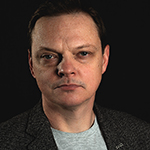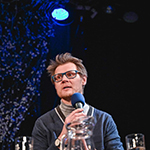Link
the organism undertakes a reading
reading rattles the entire organism
a record of stone
skin saliva excrement
if titanium or nail they too would be
recorded or the marrow of its name
describes the skin the lip soaks up the ink
a morpheme will pass a transplant
in a tube of glomeruli a phoneme
the oxolate will exude a graph
a lymph into alighted autograph
breathed into print
the meat syllable-sliced
& the nail will grow
the song will build hair
horn collagen sebum
the print will deposit detach
correction current on the beam
Neophyte refined
the poem searches beyond
the poem that corrodes
doesn’t code nor clap
algorithmically doesn’t buy
a billboard of bullshit
doesn’t fund slush nor skeeze
doesn’t intercede
digests thru concrete & ice
says: “capital
is dead I gleam
over a dead billboard
I crush the neon sign into hoarfrost
let gasoline run thru me
over the ice I bind
dead gas into a bundle
that’s how I loved you”
Translator’s Note:
If the material substance of our world—minerals, plants, residual tissues, organic and inorganic matter—is alive and agentive, why shouldn’t it express its fears, beliefs, and dark energies? This is a pivotal question Polish poet, translator, and critic Kacper Bartczak has explored in a recent series of interlocking books: Wiersze organiczne [Organic Poems], Pokarm Suweren [Food Sovereign], and Naworadiowa [Radionaves]. On scales as vast as the cosmological or geological or as minute as the molecular, Bartczak considers how cultural dynamics rife with alchemical dangers or polluted delusions have fed contemporary Polish political discourse and reality.
Because these three collections can be read as a triptych, they open up a translational opportunity to think both latitudinally and longitudinally about relationships between poems: if “the poem searches beyond /the poem that corrodes,” how might a word, phrase or line leap or mutate across stanzas or books? With the example of “nie kręci nie mrozi lodu” from “Neofita rafinata” (“Neophyte refined”), a poetic gene can mutate midline. Here the poet takes the Polish idiom, “ktoś kręci lody”—which would literally be “somebody makes ice cream” but is normally used to describe self-interested schemers or those running sketchy side-hustles—and puts the phrase through a sort of mitosis, splitting, stretching, and negating the terms so that it retains the nucleus of the idiom but becomes part of a larger, more expansive critique of late capitalism within the poem. Since there is no obvious English equivalent to the idiom, my solution, “doesn’t fund slush nor skeeze,” signals both the icy elements of the original and the “I-Me-Mine” myopic behavior common on Wall Street.
Bartczak’s poetic organisms breed syllables that cut through meat while “the song will build hair / horn collagen sebum.” His is a lyric on return from deep space, a kind of 21st-century Copernican catechism that sifts through “a record of stone /skin saliva excrement” to read a bundle of gas collapsing in on itself as expression of love.

Kacper Bartczak is a Polish poet, scholar, and translator. Recent poetry volumes include Czas Kompost [Time Compost] (2023), Widoki wymazy (2021), Naworadiowa [Radionaves] (2019), Pokarm suweren [Food Sovereign] (2017), and Wiersze organiczne [Organic Poems] (2015). He has translated and published volumes of poetry by Rae Armantrout, Charles Bernstein, and Peter Gizzi, and many other poets into Polish. In English translation, his poetry has appeared (or is forthcoming) in Poetry, Denver Quarterly, Interim, Berlin Quarterly, Aufgabe, Jacket2, and Lyric. He is an associate professor and department chair at the University of Łódź. Photo by Grzegorz Wołoszyn & Biuro Literackie.

Mark Tardi is a writer and translator whose recent awards include a 2023 PEN/Heim Translation Grant and a 2022 National Endowment for the Arts Translation fellowship. His most recent books are The Circus of Trust, and translations of The Squatters’ Gift by Robert Rybicki and Faith in Strangers by Katarzyna Szaulińska. His writing and translations can be found (or are forthcoming) in Poetry, Conjunctions, Denver Quarterly, Interim, Guernica, Cagibi, Tupelo Quarterly, Full Stop, and elsewhere. Viscera: Eight Voices from Poland is forthcoming from Litmus Press in 2024. He is on faculty at the University of Łódź. Photo by Joanna Głodek.

 BACK TO ISSUE
BACK TO ISSUE